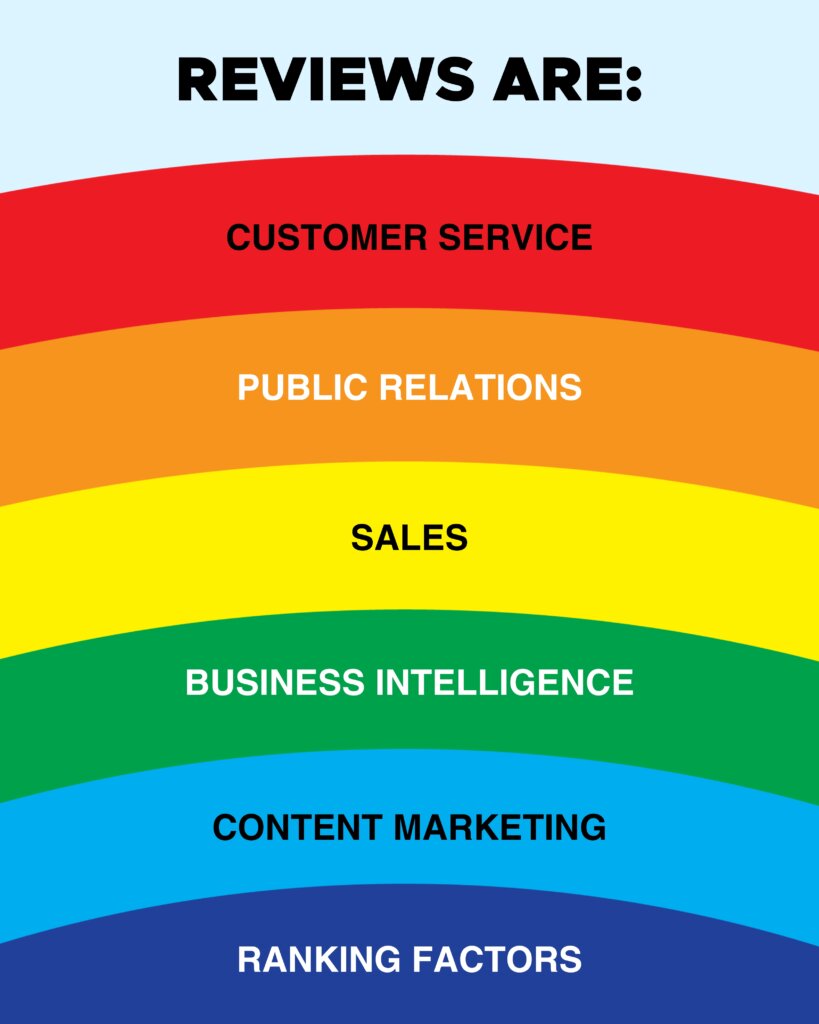🤓 The 2026 Local Search Ranking Factors are here!! Check out the report!
🤓 The 2026 Local Search Ranking Factors are here!! Check out the report!



Onboarding a new employee to your in-house marketing team or digital marketing agency? Need to get ahead of your competition in Google’s local packs and Maps? Today’s column is for you! Bookmark it, share it, and boost your brand’s understanding of why local business reviews deserve to sit at the center of your local search marketing strategy.
In this column I’ll cover the mindset you can bring to this form of user generated content (UGC) that reveals its true impacts.
The sight of a rainbow is aweing enough to make people stop whatever they are doing for a moment to gaze in wonder at the gorgeous array of colors in the sky. As an artist, I believe it’s getting to see all of those vivid hues in a single glance that captivates people.

I’m hoping that by putting the full spectrum of local business review powers all in one place for you, you’ll come to share my sense of wonder at the majestic big picture of the many ways in which this content helps local brands.
The term “customer service” may initially call to mind ideas of help desks and helplines, but as soon as the public was granted the power to start reviewing local businesses online, it redefined the meaning of this traditional term.
I’ve been reading every review-oriented survey I could get my hands on for decades, and these high-level takeaways from years of published research demonstrate why it’s smart to see reviews as a customer service medium:
Large local business enterprises may devote millions to PR campaigns, but review-oriented surveys have helped me understand the following:
Happy reviewers don’t just create good public relations for your brand – they deliver profits. Local searches like “vegan pizza near me”, “emergency vet”, and “plus size clothing store boise” all have a transactional intent and cause Google to surface Google Business Profiles and local pack results. Anyone accessing these results is on the verge of choosing a brand with which to do business.
Positive reviews turn up at just this critical moment in the buyer’s journey, and can convert a searcher into a shopper if the UGC they read convinces them that your business is the best local choice for their needs. Given this, these unpaid and unofficial brand evangelists don’t just persuade the public that you have a great reputation – they can profoundly affect your bottom line.
This is all the more reason to use the owner response function to thank every customer who has volunteered their good opinion of your business. It shows your gratitude, not only to the reviewer, but to any other customer who is weighing whether to spend a few minutes of their free time writing a review of your brand.
There is value in conducting formal consumer surveys to better understand the communities you serve, but these can involve both considerable time and expense. By contrast, your review corpus is always free, always fresh, and filled with invaluable business intelligence. Consider the following:
Given what we’ve learned about the public trusting review sentiment over brand messaging, take the brilliant and logical next step of putting this form of UGC at the center of your content marketing strategy in all of the following ways:
If you need to get more buy-in and budget from the SEO-minded folks in your organization to place a higher priority on review management, this is the section to share with them. The annual Whitespark Local Search Ranking Factors Survey consistently finds that aspects of Google Business Profile reviews directly impact rankings in Google’s local packs, local finders, and Maps. The most recent edition of this survey of world class local search marketers finds that all of the following have an impact on how well businesses rank in Google’s local results:
All of these signals number among the top 50 most important Google Business Profile ranking factors, meaning that each one is deserved of management. Both the most impactful factor (high numerical star ratings) and the factor lower down the list (positive sentiment in review text) will result directly from the quality of the customer experiences your brand is providing. They demonstrate the crucial nature of all forms of customer service. The other factors in this list, however, require additional consideration.
Now that we’ve looked at the full rainbow of review powers and understand their deep and varied impact on local brand success, you’re likely wondering how to acquire as much of this potent UGC as possible. We’ll cover this in next week’s post!

Miriam Ellis is a local SEO columnist and consultant. She has been cited as one of the top five most prolific women writers in the SEO industry. Miriam is also an award-winning fine artist and her work can be seen at MiriamEllis.com.
Whitespark provides powerful software and expert services to help businesses and agencies drive more leads through local search.
Founded in 2005 in Edmonton, Alberta, Canada, we initially offered web design and SEO services to local businesses. While we still work closely with many clients locally, we have successfully grown over the past 20 years to support over 100,000 enterprises, agencies, and small businesses globally with our cutting-edge software and services.